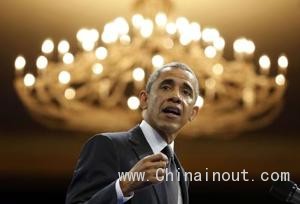
羅伯塔。蘭普頓
華盛頓(路透社)——美國總統(tǒng)巴拉克•奧巴馬(Barack Obama)說,美國企業(yè)在他的經(jīng)濟政策下已經(jīng)做得很好,但是首席執(zhí)行官應(yīng)該停止抱怨法規(guī),,并去承擔(dān)更大的社會責(zé)任,,他對《經(jīng)濟學(xué)人》雜志提到。
“如果你看看在過去四五年發(fā)生了什么事,處在權(quán)利頂端的人沒權(quán)抱怨,”奧巴馬在采訪中說上周進行的,周六晚在該雜志的網(wǎng)站上發(fā)布。
共和黨人試圖將奧巴馬描繪成反商業(yè)行為,企業(yè)抱怨稱,奧巴馬簽名通過的醫(yī)療法案和多德-弗蘭克(dodd - frank)金融改革提高了企業(yè)成本,。
商業(yè)團體在游說反對他遏制電廠碳排放引起氣候變化的的新計劃,。
“我將企業(yè)社區(qū)的投訴比作一粒鹽,”奧巴馬說,他認為政策有利于商業(yè)的發(fā)展,。“他們總是抱怨監(jiān)管,。這是他們的工作。”(更多全球資訊請點擊瀏覽)
奧巴馬日益提升民粹主義經(jīng)濟措施,,比如提高最低工資,,這是激勵民主黨選民11月國會選舉前的關(guān)鍵,期間他的民主黨面臨失去參議院的控制權(quán)的危險,。
“通常情況下,你會聽到一些對沖基金經(jīng)理說,“哦,他只是想引起階級不滿”。不,。隨時保持你的房子在漢普頓和你的商務(wù)飛機,等等,。我不關(guān)心你用什么樣的方式生活,”奧巴馬說,。
“我關(guān)心的是確保我們有一個普通人只要努力工作,并負責(zé)任就可以獲得成功的系統(tǒng)”他說。
奧巴馬在他的第一個任期內(nèi)與金融商業(yè)關(guān)系比較淡,他告訴采訪者:“我沒有競選去幫助一群華爾街肥貓銀行家,。”
白宮方面言辭已經(jīng)緩和了,奧巴馬連任上臺已聯(lián)合美國公司支持推進實際行政措施,,雇用長期失業(yè)者,在學(xué)校獲得更好的技術(shù)和為年輕的非裔美國人提供更多的機會,。
奧巴馬抨擊共和黨人對他所謂的一系列“反全球化”停滯了重新授權(quán)進出口銀行的資金,他說這會損害美國企業(yè)在海外貿(mào)易融資,。但在采訪中,奧巴馬指責(zé)企業(yè)缺乏社會責(zé)任,理由是“普遍觀點”,“唯一的責(zé)任,公司CEO是他的股東,。” (更多全球資訊請點擊瀏覽)
“CEO們所宣稱的價值觀和愿景和他們在華盛頓的說客們的行為存有巨大的差距,”他說,。
”我一直的挑戰(zhàn)是:你的說客是否在為保持你們已有的稅收減免而努力?如果答案是否定的,那么你不并太多關(guān)心你說的事,。”
(Lynne O ' donnell和EricWalsh編輯)
Obama says CEOs should quit complaining: Economist
By Roberta Rampton
WASHINGTON (Reuters) - President Barack Obama said corporate America has done well under his economic policies, telling the Economist magazine that chief executive officers should stop complaining about regulations and show greater social responsibility.
"If you look at what's happened over the last four or five years, the folks who don't have a right to complain are the folks at the top," Obama said in an interview conducted last week and posted on the magazine's website late on Saturday.
Republicans have sought to portray Obama as anti-business, and businesses have complained that Obama's signature healthcare law and the Dodd-Frank financial reforms have raised costs.
Business groups are lobbying against his new plan to curb climate-changing carbon emissions from power plants.
"I would take the complaints of the corporate community with a grain of salt," Obama said, arguing that his policies have been friendly to business. "They always complain about regulation. That's their job." (更多全球資訊請點擊瀏覽)
Obama has increasingly promoted populist economic measures such as raising the minimum wage to motivate Democratic voters ahead of critical November congressional elections, in which his Democrats face the prospect of losing control of the Senate.
"Oftentimes, you'll hear some hedge-fund manager say, 'Oh, he's just trying to stir class resentment'. No. Feel free to keep your house in the Hamptons and your corporate jet, etcetera. I'm not concerned about how you're living," Obama said.
"I am concerned about making sure that we have a system in which the ordinary person who is working hard and is being responsible can get ahead," he said. (for more global news please click here)
Obama had a frosty relationship with business in his first term, famously telling an interviewer: "I did not run for office to be helping out a bunch of fat cat bankers on Wall Street."
The White House had toned down that rhetoric, and in Obama's second term has rallied corporate America for support to advance executive actions to hire the long-term unemployed, get better technology in schools and provide more opportunities for young African-American men.
Obama slammed Republicans for what he termed a thread of "anti-globalization" that has stalled reauthorization of funding for the Export-import Bank, which he said would hurt U.S. businesses trying to finance overseas trade. But in the interview, Obama chided business for a lack of social responsibility, citing a "general view" that "the only responsibility that a corporate CEO has is to his shareholders."
"There's a huge gap between the professed values and visions of corporate CEOs and how their lobbyists operate in Washington," he said.
"My challenge to them consistently is, 'Is your lobbyist working as hard on those issues as he or she is on preserving that tax break that you've got? ' And if the answer is no, then you don't care about it as much as you say." (for more global news please click here)
(Editing by Lynne O'Donnell and EricWalsh)











